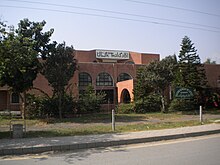Pakistan Academy of Letters
 | |
| Abbreviation | PAL |
|---|---|
| Formation | July 17, 1976[1] |
| Legal status | A national academy in Pakistan[1] |
| Purpose | Publication of literary and related works, promotion of authorship and literary exchanges.[1] |
| Headquarters | PAL Secretariat |
| Location | |
Region served | Worldwide |
Official language | English and Urdu |
Chairman | Prof. Dr. Yousuf Khushk |
Main organ | Pakistan Academy of Letters, Islamabad, and The Board of Governors |
| Website | pal |
The Pakistan Academy of Letters (PAL) (Urdu: پاکستان اکادمیِ ادبیات) is a national academy with its main focus on Pakistani literature and related fields.[2] It is the largest and the most prestigious learned society of its kind in Pakistan, with activities throughout the nation. It was established in July 1976 by a group of renowned Pakistani writers, poets, essayists, playwrights, and translators, inspired by the Académie Française.[1]
PAL as a government institution[]
After its founding in 1976 and as of 2016, Pakistan Academy of Letters remains a government-sponsored institution. It works under the jurisdiction of Ministry of Information, Broadcasting and National Heritage (Pakistan).[1]
The poet Ahmed Faraz was appointed its first Director. It is an autonomous non-profit organisation, supervised by its own Board of Governors, receiving support from the Government of Pakistan as the apex national institution.[1]
The Academy maintains several regional offices, and links with other national and international organizations of a similar status. Its agenda includes promotion of literary education, publication and documentation. with a view to promoting and fostering Pakistani literature, literary activities in Pakistan, and systematizing the support mechanism to writers and scholars of Urdu, Punjabi, Saraiki, Sindhi, Pushto, Balochi, English and other Pakistani languages.[2]
PAL's founding fellows[]
In 1978, Ishtiaq Hussain Qureshi became the first Chairman of its Founding Fellows, among whom were prominent 'men of letters' representing different languages of Pakistan:[1]
- Ishtiaq Hussain Qureshi (history) (first chairman)
- A. K. Brohi (philosophy)
- Hafeez Jalandhri (Urdu language)
- Syed Abdullah (Urdu language)
- Ahsan Danish (Urdu language)
- Ahmed Nadeem Qasmi (Urdu language)
- Shareef Kunjahi (Punjabi language)
- Nabi Bakhsh Khan Baloch (Sindhi language)
- Syed Rasool Rasa (Pashto language
- Sardar Khan Gashkori (Balochi language
- Professor Ahmed Ali (writer) (English language)[3]
Board of Governors appointed in 1978[]
First Board of Governors[]
- Ishtiaq Hussain Qureshi (first chairman)[1]
- Ashfaq Ahmad
- Abul Khair Kashfi
- Pareshan Khattak
- Syed Mujtaba Hussain
- Two representatives from the Ministry of Education
- One representative from the Universities Grants Commission (now the Higher Education Commission of Pakistan)
Pakistan Academy of Letters was established in 1976 but its Board of Governors were not officially appointed by the Government of Pakistan until 1978, when its objectives and functions were also determined.[1]
Academy's support for the writers[]
The Pakistan Academy of Letters gives annual awards for the best original books (within the literary and critical categories) written in all the major languages of Pakistan. In 1980, Shafiq-ur-Rehman was appointed the Academy's first Chairman. He has been followed in this fixed-tenure position by a number of writers.
From time to time, the Academy nominates Fellows, and more restrictively some Life Fellows, who earn the privilege of using the post-nominal letters FPAL. The Fellowship of the Academy is highly selective, indicating high distinction in the respective field, and is only awarded to those who are recognized to have contributed extraordinary work to enrich the creation and understanding of Pakistani literature.
Commemorative postage stamp issued for the academy[]
- On 24 September 2003, Pakistan Postal Services issued a commemorative postage stamp on the 25th anniversary of the academy's 'official founding' in 1978.[2]
External links[]
References[]
- ^ Jump up to: a b c d e f g h i "ISPR offices in NAs demanded". DAWN.COM. 31 December 2001. Retrieved 19 May 2020.
- ^ Jump up to: a b c "Pakistan Academy of Letters".
- ^ "Professor Ahmed Ali's profile". pakpost.gov.pk.
- Learned societies of Pakistan
- Pakistani writers' organisations
- National academies
- 1976 establishments in Pakistan